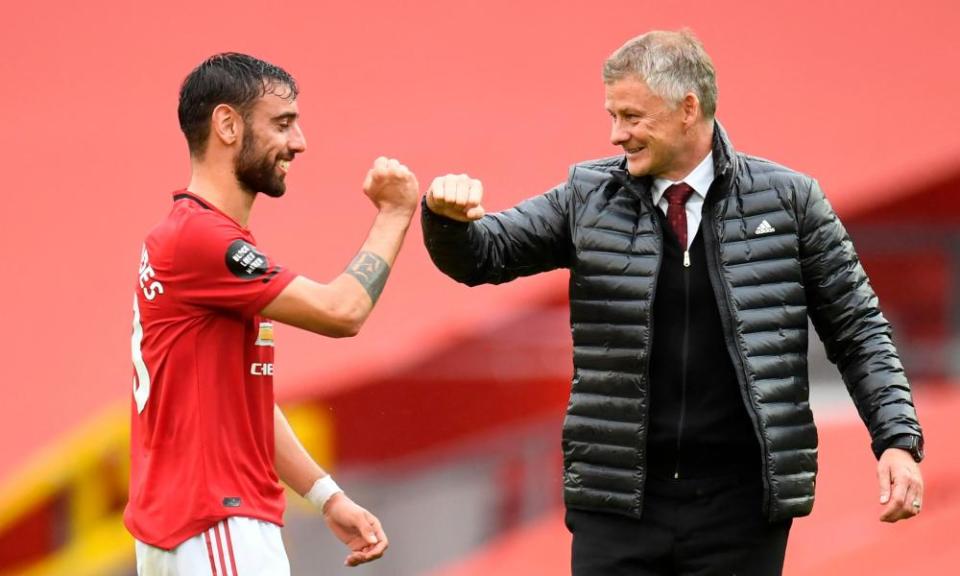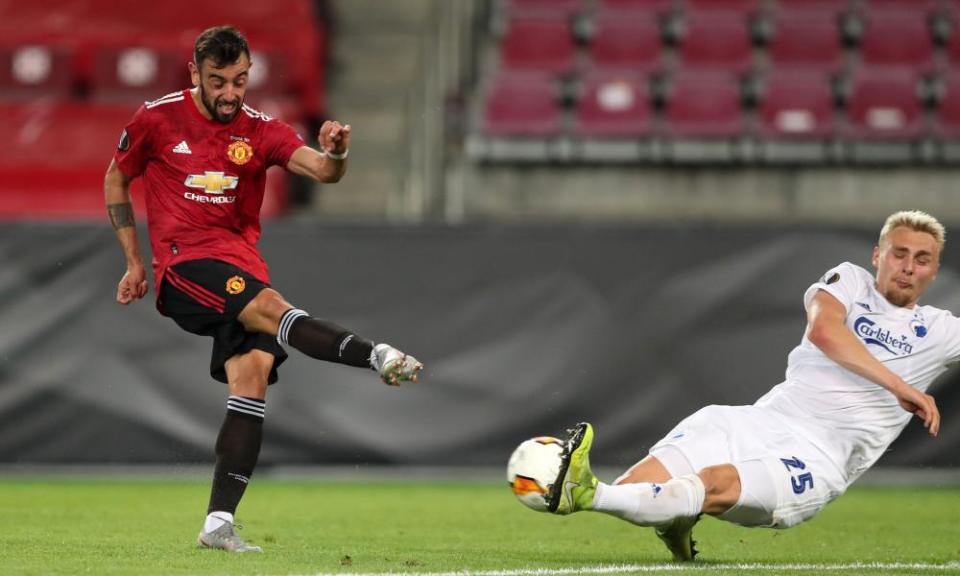Ole Gunnar Solskjær shows talent is often more important than tactics

It is eminently possible that there are more opinions expounded on football than on any other subject, feeding into a circle both vicious and virtuous that goes round and round until everybody dies. Consequently, attempts to seek novelty are understandable: it’s comforting to believe that what we’re seeing now is different from anything seen before. Ultimately, though, the game’s essentials don’t change and football is simple but people are complicated, which means that the finite elements of talent and mentality will always be more important than the dynamic aspects of tactics and coaching.
Ole Gunnar Solskjær plainly understands this, but he is derided for lacking acumen and expertise. Given the way his Manchester United team have progressed, this is slightly surprising – the pool of evidence is rapidly decreasing, drained by performances, style and results.
It is true that early last season, United sometimes struggled against teams who defended deep and in numbers; what progress demands we call a “low block”. But despite the prevailing narrative, the problem was not one of strategy but of quality – to all bar those expecting creative wizardry from Scott McTominay, Andreas Pereira, Jesse Lingard and Fred. So in January Solskjær signed Bruno Fernandes, whose transformative impact has also repurposed as criticism.
Related: Bloody-minded characters could lift Pep Guardiola to greater success | Daniel Harris
Fernandes is not the sole reason for United’s improvement. Around him, others are developing, most particularly Anthony Martial. And though injuries stopped them sustaining it, United produced some decent football before Fernandes’s arrival; he is talisman but not totality, a nexus that elevates the work already done. Identifying then solving a problem, in the best possible way, does not reflect bad management.
Despite a creditable record against other members of the top six, Solskjær’s approach in those games is often used to illustrate his limitations. But this was circumstantial, not philosophical – he set his team up to counterattack because he had no other option. And in the draw with Liverpool, United’s goal came exactly as he planned, while their league win at Manchester City – a well-coached side they beat three times last season – was fired by a complete first-half display.
Solskjær’s devotion to his vision is best illustrated by his sale of Romelu Lukaku, a fine player many would have kept but one he deemed unsuitable for a fast, aggressive, technical side. Similarly, had Solskjær used Mason Greenwood when Martial was injured, United would probably have accumulated more points. But again, instead of doing the easy thing – the thing most likely to preserve his job – he did the right thing, bringing a young player on slowly before promoting him to first choice once he had filled out.

Inability to coordinate movements in the modern manner is another frequent complaint, though this contradicts both what is said and what is done. Solskjær can discuss “pressing triggers” – formerly known as “puttin’ ‘em under” – with the best of them, and does not think attacking cohesion should be purely spontaneous.
“We do work a lot on patterns and position,” he said recently. “We understand that you might pop up on the right or the left or be in different positions, but we have to fill different positions.”
This is obvious from watching United play. The quick interactions, third-man runs and familiar patterns – especially down the left – do not happen by chance and enable them to sustain their attacks, resulting in 50 goals scored in the last 23 games. But though Michael Carrick, in particular, has drilled these movements around the box, they are a facility of time as well as of coaching – the longer players play together, the more they understand how to play together, the greater their confidence when playing together.
Solskjær is not, though, as prescriptive as some, most notably Pep Guardiola and Jürgen Klopp. Given they are the best around, this is worth paying attention to, though as Solskjær is an intelligent man who spent his playing career studying the game, it is also worth wondering whether they grasp the mechanics of attack better than he does.
Related: Manchester United's failings give added meaning to transfer window
Guardiola’s ideal – automatons performing automatisms too quickly for opponents to cope – is difficult to combat when it works. But there can also be problems when it does not, which is why various of his failures were capitulations. Moreover, despite Guardiola’s cerebral genius, he has yet to reach a Champions League final without the greatest player and greatest midfield ever.
Klopp employs a simpler method: win the ball high and use Roberto Firmino and the full-backs to playmake for wide attackers, the balance provided by three runners in midfield. There are subtleties within that, but Liverpool are not a brilliant team because Klopp is a brilliant tactician and a brilliant coach; Liverpool are a brilliant team because Klopp is a brilliant motivator and a brilliant man who inspires brilliant players to do brilliant things previously believed to be beyond them. Or, put another way, imagine a manager other than Klopp giving Klopp’s instructions to Klopp’s players, then imagine Guardiola giving Guardiola’s instructions to players other than those Guardiola has had.
It is no coincidence that Alex Ferguson’s great strengths were spotting talent, then coaxing the maximum from it. When his teams went down to 10 men, he left the reorganisation to those on the pitch because he had nurtured and empowered them to make their own decisions; just as assessing ability is a skill, so is assessing mentality and assessing when to just sit down. In any event, sophisticated strategising need not imply a detailed managerial plan, and who is to say that any coach knows more about constructing attacks than high-level players? What sets apart Bayern Munich’s treble winners from the rest is that in almost every position, they have a fantastic football player with a fantastic football brain.
Not everything about Solskjær is positive – it is impossible to praise his work without mentioning Josimar’s reporting on his involvement with Babacar Sarr and Jim Solbakken. And, on the pitch, in draws with Southampton and West Ham, United struggled to play through a press, while their defensive record is much better than their actual defending, and was a principal factor in three semi-final defeats. There remains lots of room for improvement and lots of scope for error.
Inexperienced managers must necessarily learn on the job, though Solskjær’s achievements at Molde – winning the championship with a club that had never previously done so, retaining it, and topping a Europa League group featuring Celtic, Ajax and Fenerbahce – should not be sneered at. Under him, United have grown quickly and substantially, which is to say that in little more than a year he has rejuvenated a team who were an absolute state – a feat beyond both Louis van Gaal and José Mourinho, two bona fide legends of the game.
Still, though, there remains a strong chance Solskjær will not win a title – besting both Guardiola and Klopp might be beyond every manager in world football. But the key question, which persists despite the arrival of Donny van de Beek, is not one of tactical ingenuity or coaching chops, but whether the Glazers will allow Solskjær to buy the talent and mentality necessary to give his tactics and coaching a proper chance.

 Yahoo Sport
Yahoo Sport 





































